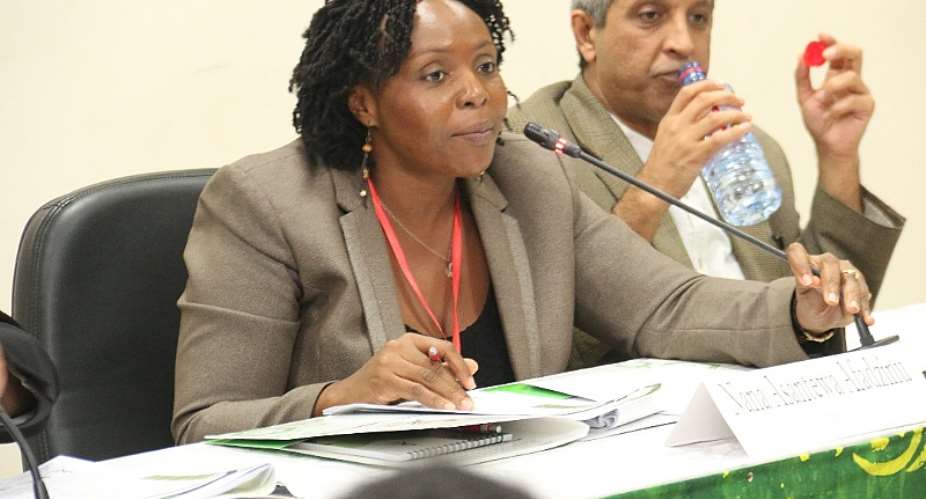About fifty (50) participants made up of scholars and researchers of civil society from Africa, Europe, North America, South America and Australia, as well as some members belonging to the Africa Regional Network of the International Society of Third Sector Research (ISTR), have converged in Accra, Ghana, for 4th ISTRAN conference.
The three-day conference which started on Tuesday, June 20 and expected to end by 23rd June is being held on the theme: “Civil Society and Philanthropy in Africa: Contexts, Contradictions and Possibilities”. However, an inaugural PhD workshop will continue on Friday for researchers and PhD students.
The conference is organized by the International Society of Third Sector Research (ISTR) in partnership with the West Africa Civil Society Initiative (WACSI), the University of Ghana Business School (UGBS), Mott Foundation and the Open Society Initiative (OSISA).

In an address, the Executive Director of WACSI, Nana Asantewa Afadzinu, disclosed that the objective of the conference is to allow for the exchange of research findings and practical experiences between academic researchers, civil society activists and development practitioners in Africa.
She stated that in driving the goal and sustainability of civil society in Africa, it has become critical to address issues about the trends and trajectories of philanthropy in the African continent and the partnership needed to mobilize domestic resources.
Citing the Ashanti Kingdom as a case study, Nana Asantewa said Philanthropy is not new to Africa owing to facts contained in a publication ‘Giving to give’ edited by author and researcher, Bheki Moyo, that ‘giving’ existed in the pre-colonial Ashanti Kingdom here in Ghana.
According to the said publication, philanthropy acts were motivated by a strong consideration for the dignity of all community members; in which help was given as a means of bringing people out of difficulty.

Nana disclosed that the ‘act of giving’ continues to be deeply enfolded into the fabric of modern African societies, and interest in the philanthropic sector in Africa as being practised and as a viable alternative to international aid and foreign donor dependency is comparatively budding.
She stated however, that the changing context and landscape of civil society and diverse challenges threatening its sustainability calls for Africans to take charge in mobilising the needed resources for the continent’s development needs.
The WACSI Executive Director charged the participants to actively participate in the discourses in order to come up with innovations and recommendations for civil society to leverage partnerships and effectively harness for its work in advancing the collective interests and will of the citizens they serve.
Taking his turn to speak on “Giving in Africa”, Professor Adam Habib, Vice Chancellor and Principal of University of Witwatersrand, Johannesburg, South Africa, said to improve civil society and sustainability in Africa, there is first the need to come to terms with the needs of the African continent.
He also called for accountability dynamism and world class research to be embedded in the activities of civil society in Africa.
Professor Habib also advocated African philanthropists to be integrated into a national system as one sure way of accessing giving for the work of civil society.
A statement read on behalf of the Dean of UGBS, Professor Joshua Yindenaba Abor, indicated among other things that managing civil society in Africa to achieve their aim has become difficult because it is being faced with bigotry, ethnocentrism, and pettiness.
He called for attitudinal change in the sector, while urging the participants to actively contribute in the deliberations and also help to identify African philanthropists who will help the drive the civil society vision in Africa together.
About ISTR
ISTR was founded in 1992 and is recognized and valued for its special role as a convenor of scholars and policy makers on third sector from around the world.
Its Africa Regional Network is a community of over 130 scholars and researchers of civil society living in African countries and includes members of the African Diaspora who work in the USA and Europe.
The Network forms part of a larger global network of over 750 members.
ISTR President is Steven Rathgeb Smith.





 Dumsor must stop vigil part 2: We’ll choose how we demonstrate and who to partne...
Dumsor must stop vigil part 2: We’ll choose how we demonstrate and who to partne...
 2024 elections: NDC stands on the side of morality, truth; NPP isn't an option —...
2024 elections: NDC stands on the side of morality, truth; NPP isn't an option —...
 Akufo-Addo has moved Ghana from 'Beyond Aid' to ‘Beyond Borrowing’ — Haruna Idri...
Akufo-Addo has moved Ghana from 'Beyond Aid' to ‘Beyond Borrowing’ — Haruna Idri...
 Train crash: NDC is full of evil mindset; driver who 'deliberately' parked the c...
Train crash: NDC is full of evil mindset; driver who 'deliberately' parked the c...
 Dumsor: Energy Minister must be fired; it’s becoming unbearable — IES
Dumsor: Energy Minister must be fired; it’s becoming unbearable — IES
 #DUMSORMUSTSTOP: IMANI responds to Yvonne Nelson's call for a joint vigil
#DUMSORMUSTSTOP: IMANI responds to Yvonne Nelson's call for a joint vigil
 'Obiara b3didi' — Manhyia South NPP Chairman fights for resourcing of NPP grassr...
'Obiara b3didi' — Manhyia South NPP Chairman fights for resourcing of NPP grassr...
 Dumsor: This thing is becoming unbecoming, collapsing our business — Nana Ofori ...
Dumsor: This thing is becoming unbecoming, collapsing our business — Nana Ofori ...
 Dumsor: It'll be no more by the end of April — Gideon Boako assure Ghanaians
Dumsor: It'll be no more by the end of April — Gideon Boako assure Ghanaians
 "I can now see clearly with my two eyes, thanks to the generosity of Afenyo-Mark...
"I can now see clearly with my two eyes, thanks to the generosity of Afenyo-Mark...
